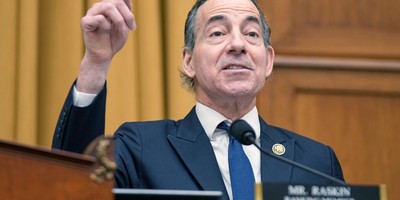It's a tradition that goes back at least to 1800, when John Adams and Thomas Jefferson were castigating each other. Op research is scarcely a new invention.
Advertisement
Not even George Washington, Father of His Country, was immune to such attacks. The first president was scarcely popular after Jay's Treaty with Great Britain was negotiated in his second term. To quote one rallying cry as Jeffersonians from one end of the new republic gathered to denounce the treaty as a Federalist plot: "Damn John Jay! Damn everyone that won't damn John Jay!"
A supporter of the treaty -- indeed, he'd help draft it -- wrote at the time: "It was to have been foreseen, that the treaty which Mr. Jay was charged to negotiate with Great Britain, whenever it should appear, would have to contend with many perverse dispositions and some honest prejudices; that there was no measure in which the government could engage, so little likely to be viewed according to its intrinsic merits -- so very likely to encounter misconception, jealousy, and unreasonable dislike." --Alexander Hamilton.
Col. Hamilton was himself pelted with stones by an angry crowd for the crime of talking sense about that controversial treaty.
The furor over the treaty was one of the first outbreaks of the partisan fever that has overtaken American politics periodically ever since, usually in election years. As a clear-eyed historian would later sum up the disputatious air that characterized debates over the treaty:
Recommended
Advertisement
"The Jay Treaty was a reasonable give-and-take compromise of the issues between the two countries. What rendered it so assailable was not the compromise spelled out between the two nations but the fact that it was not a compromise between the two political parties at home. Embodying the views of the Federalists, the treaty repudiated the foreign policy of the opposing party."
Vicious attacks have come with the unruly territory that is the two-party system ever since. For in a free country, liberty cannot be separated from license, free speech from its abuse by the dishonest or just sincerely misled. "Politics ain't beanbag," as Finley Peter Dunne's fictive Irish barkeep, Mister Dooley, observed circa 1900. It still ain't.
To quote a perspicacious foreign observer back in the 1830s, whose study "Democracy in America" remains the best guide to the curious habits of the American body politic and spirit in general, our presidential election is "a revolution in the name of the law."
Here is how M. de Tocqueville described the presidential campaign he witnessed:
"Long before the appointed day arrives, the election becomes the greatest, and one might say the only, affair occupying men's minds. ... The President, for his part, is absorbed in the task of defending himself before the majority. ... As the election draws near, intrigues grow more active and agitation is more lively and widespread. The citizens divide up (and the) whole nation gets into a feverish state."
Advertisement
Sound familiar? How little things have changed, which is another tribute to the continuity of American history.
Even more remarkable is what happens after election fever breaks: Everything suddenly calms down, like a great river returning to its banks after a flood that has swept everything away. As if there had never been any Great Divide at all. And life flows on.
It'll be a great day, Wednesday, November 7, 2012. The flood will be over. The waters will begin to recede. Look for a dove to descend with an olive branch.
But while passions mount, so does zealotry. Only the perspective that time lends may cure it.

























Join the conversation as a VIP Member